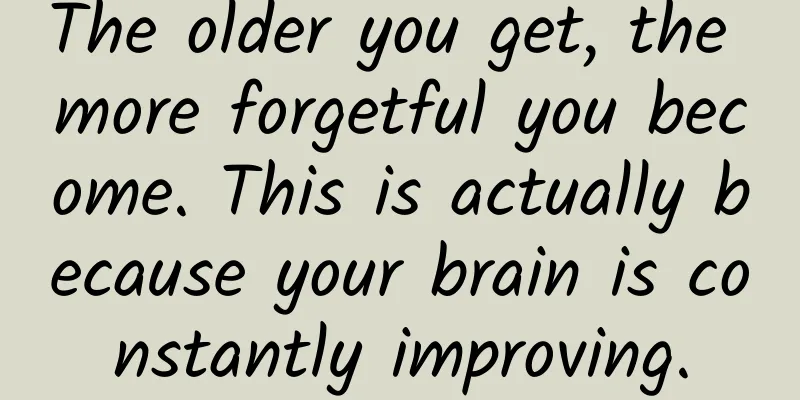The older you get, the more forgetful you become. This is actually because your brain is constantly improving.

|
Many people think that forgetting is not a good thing in itself, and we should try to remember everything as much as possible. But in fact, "forgetting" is one of the important functions of the brain. It can be said that in order to maintain the normal functioning of the brain, it is necessary to actively forget certain things. I hope this article can make everyone understand this and help everyone to live in peace with forgetfulness and move towards it in life. This article is authorized to be excerpted from "The Forgotten Brainpower" (Science and Technology Press of China, January 2025 edition). Written by Iwatate Yasuo Translation | Zheng Shiyu As people age, they become more and more forgetful. At this time, the number of nerve cells will gradually decrease, and the total amount of human memory will continue to shrink. Even if you don't want this to happen, you can't help it. Although the elderly have forgotten some insignificant things, the total amount of memories retained over the years is still quite large. At the same time, the number of nerve cells allocated to different memories is also decreasing, making it difficult for new things to be retained in memory. For the elderly, their brains are already filled with all kinds of memories, and there is no room to retain those insignificant things. However, forgetting is a natural part of everyday life and is not necessarily a bad thing. Rather, forgetting is a great example of the brain’s ability to positively change by looking to the future. In the hippocampus, new neurons are generated every moment, and existing neurons are continuously cleared, that is, past memories are constantly cleared, so that new memories are acquired. In other words, "forgetting" and "acquiring new memories" are mutually dependent. Only by going through the above process can an individual's brain continue to improve. In order to acquire new memories, old memories are constantly eliminated In fact, the brain already has a mechanism of "active forgetting". It turns out that the brain is not trying hard to maintain memory, but instead quickly clears memory. Even more surprising is that the brain science community has confirmed that there is a protein in the human body that can actively speed up the forgetting process. It is called "Rac1". This protein molecule belongs to the class of “low molecular weight G proteins” [1] . It plays the role of a molecular switch that accelerates the transmission of information within cells. In addition, the Rac1 molecule is closely related to the shape and movement of cells, the adhesion between cells, the use of genes, etc., and its functions also involve multiple fields. Brain science has confirmed that once Rac1 appears in the brain, active forgetting will occur. In addition, Rac1 also has the function of changing the shape of the cytoskeleton "actin filament". Cell protrusions are important places for synapses to form. The above function will lead to the disappearance of cell protrusions, resulting in the regressive changes of synapses and the disappearance of memories. The brain is excited to receive new information and secretes a large amount of dopamine. At the same time, the amount of Rac1, which promotes active forgetting, increases. Dopamine-producing nerves are densely distributed in the hippocampus, and they cause changes in synapses, thereby promoting the generation of new memories. In contrast, the brain also activates Rac1 at the same time to eliminate old memories. Many people would be surprised to learn that the brain actively produces proteins that "destroy memory". Before, I felt mixed emotions when I was forgetful. I felt sad, angry, and a little disappointed. However, after I became familiar with this fact, I was able to tolerate my forgetfulness and felt refreshed. Forgetting can be called "proof of challenging new things". In fact, Rac1 is not the only one that actively erases memories. Microglia are immune cells in the brain that precisely remove neurons that belong to glial cells and are less used. Some neurons in the hippocampus lack activity and are in the process of forming synapses, so microglia will continue to engulf and remove these neurons. This practice is intended to help memories be retained for a long time. Microglia actively eliminate redundant and useless neurons, thereby forming more efficient neural circuits and helping those commonly used neurons to function better. The reason is that if most of the neurons that lack activity are connected to each other, it will hinder the normal operation of the neural circuit. After a large amount of redundant information is input, it takes time and effort for the brain to process them, and it is more likely that it will not be able to make correct and reasonable judgments in the end. In comparison, a more efficient approach is to combine those more commonly used neurons with accurate information to deduce conclusions. In this way, microglia optimize neural circuits by removing neurons with lower ion activity. As mentioned above, the brain keeps working hard to actively forget. In the end, we retain the indispensable memories. At the same time, the brain functions normally both rationally and emotionally. Older people are more likely to retain pleasant memories In addition, there is another reason: as they age, the elderly have experienced countless things, but fewer and fewer new things. In other words, the elderly can easily handle all kinds of things without noticing, and there will be fewer and fewer things that cause their emotional ups and downs. Therefore, it will become increasingly difficult for them to retain memories. This is a matter of course. Even if the elderly have difficulty remembering new things or become increasingly forgetful, this is not a symptom of a disease. In short, one of the main reasons for the elderly's forgetfulness is that "the total amount of memory is constantly increasing", and the other is that "the existing experience is already quite rich, enough to handle things calmly." Moreover, the elderly often remember things they have forgotten after a period of time, such as the names of artists, etc. Even if this information is difficult to remember for a while, it will not have any negative impact on their lives. Japan's Ministry of Health, Labor and Welfare defines "cognitive impairment" as "a state in which the patient's cognitive function is reduced and daily life becomes difficult due to a variety of reasons, including but not limited to brain diseases or brain dysfunction." In most cases, as people age, their brains become more and more forgetful, but this does not have a negative impact on daily life. Since the total amount of information stored in the brain is constantly increasing, at most there will be temporary confusion. However, this state cannot be arbitrarily defined as "cognitive impairment." It can be seen that it is normal for people's brains to become more and more forgetful as they age. However, in the real world, many people do not agree with this. When I chat with older people, I find that most women can say with a smile: "I have become more and more forgetful recently..." On the contrary, most men deny that they have become forgetful and try their best to fight against it. They either "refuse to accept aging" or want to restore their memory. I can also understand their inner thoughts, "I handled such matters easily when I was young" and "Even now, as long as I work a little harder, I can remember everything I saw as before." However, if you want to maximize the function of your brain, it is better to forget it. This point will be explained in detail later. On the other hand, if we differentiate and compare them according to different age groups, the results are quite interesting. Young people are more likely to retain unpleasant memories, while older people are more likely to retain pleasant memories. In the field of brain science, this is called the "positivity effect." When you are young, you think you have a lot of time left in the future. The first task at this stage is to explore the surrounding environment and learn the skills to survive. Therefore, it is very important to master new technologies and acquire new knowledge to avoid danger, maintain life and overcome difficulties. There is no doubt that if you can detect the negative signs of danger as soon as possible and deal with them, you are more likely to survive. The elderly, on the other hand, do not need to think about the distant future. In most cases, they only need to get the answer in a short period of time. People usually pay attention to negative information and danger signs to avoid crises, but the elderly pay less attention to these contents. One of the main reasons for the change is that the brain is gradually evolving year after year. As mentioned earlier, as the elderly grow older, their life experiences become richer and they can flexibly deal with various negative information. The elderly's decreased attention to negative information is closely related to their coping methods. Some people may be worried about this: the elderly pay less attention to negative information and only seek positive information. Will this increase the risk of survival? However, if the elderly aim to get the answer in a short time, they will subconsciously pay attention to the negative information related to the goal to avoid danger, so there is no need to mind. What changes is not "memory", but "the way of treating memory" Furthermore, as we age, it is not our memory that changes, but our way of dealing with memory. Once our way of dealing with memory changes, the brain can function more efficiently, and it is more like the brain is improving with age. In fact, memories can be classified according to their properties. Let’s take a look at the specific categories (Figure 1). Memory can be roughly divided into two categories: "declarative memory" and "nondeclarative memory". Memory that can be described in words is called "declarative memory", and memory that is difficult to describe in words is called "nondeclarative memory". "Declarative memory" can be further divided into "episodic memory" and "semantic memory". Please imagine the scene when you introduce yourself. You will talk about where you were born, where you grew up, your parents' personalities, where you graduated from school... The above information is about your past experiences, and they can all be described in words, so they all belong to "episodic memory". Episodic memory is the memory of personal experiences and past memories, which are all past events with time and space information. In addition, who went where last Sunday, what time to return to school tomorrow morning, everything you can imagine when recalling is included in episodic memory. Most of the time, we tend to forget episodic memories. According to research, as we age, we tend to forget mainly episodic memories. In fact, aren't the things that forgetful people tend to forget relatively simple things like names, scheduled schedules, and numbers? "Semantic memory", which also belongs to "declarative memory", is more complicated. We obtain semantic memory by understanding the words of others or the meaning attached to a certain phenomenon. In real life, we can all feel their existence, such as "there are 24 hours in a day" and "winter goes and spring comes". From academic thinking, such as "deep thinking on academic concepts such as quantum mechanics and philosophy", to common sense in life, such as "bananas are curved bow-shaped, the peel is golden when ripe, and the taste is sweet and delicious", all are included in semantic memory. "Outlook on life" and "worldview" are the foundation of a person's conduct in the world, and most of them are also composed of semantic memory. In other words, in semantic memory, it is more important to understand its meaning from personal subjective experience rather than to measure it by whether it can be converted into language. Our deep understanding of the real world around us is semantic memory. As we grow older, the total amount of this knowledge will far exceed that of our youth. Even if we are not aware of it, our behavior will be greatly affected by it. It is not an exaggeration to call it "wisdom". As mentioned above, what changes during aging is not "memory" but "the way we treat memory". During aging, humans shift from prioritizing episodic memory to semantic memory, making it increasingly difficult to acquire new episodic memory. In contrast, the total amount of semantic memory is increasing, and the brain is more likely to perform its deep functions unconsciously. I believe that readers should have known that "forgetting" is the only way to maximize the function of the brain. Moreover, as we age, it is not "memory" that changes, but "the way we treat memory". If we can combine rich personal experience with the "important memories that cannot be described in words" in our subconscious, we can give memory a new meaning. It is no exaggeration to say that this is "the brain is constantly improving year after year". Moreover, as people age, they become more forgetful, but they have more "memories that cannot be described in words" lurking in their brains, far more than young people. Most memories are dormant in the subconscious, and sometimes they emerge in the mind by chance. In fact, what is gradually forgotten as we age is episodic memory, while semantic memory is not related to age and is always accumulating. As we age, we gradually understand the essence of things and develop a certain insight. Pierre Azoulay and his team at the Massachusetts Institute of Technology (MIT) in the United States analyzed the entrepreneurial success rate of entrepreneurs of different ages, and this study is an excellent proof of the above principle. The results of the analysis show that compared with entrepreneurs aged 20 to 30, entrepreneurs over 50 have a higher entrepreneurial success rate, which further shows that "youth" is not a necessary condition for success. As they grow older, entrepreneurs with rich life experience lead their teams to success with their intuitive judgment that "cannot be described in words." Forgetting is a good thing In real life, forgetfulness caused by aging can also be seen as a signal: for example, it wants to tell you that you should change your lifestyle. People tend to forget names, scheduled itineraries, trivial values, etc., so you should take notes and actively and flexibly use the memo and schedule reminder functions on your mobile phone. Another effective method is to confess to the people around you that you have been forgetful recently. Even so, they will surely lend you a helping hand with a smile. Another important way to deal with forgetfulness is that when you get older, most things can be handled flexibly based on past experience. Therefore, we should get used to it and consciously adapt to this change. If you want to keep some memories, then be proactive and interested in the things around you. It is because we have a lot of personal experience that it is difficult to encounter unexpected events that cause personal emotional ups and downs like when we were young, so we tend to forget. This shows how important it is to be interested in the world without relying on personal experience! Today's world is different from yesterday. Let us experience the world that is updated every day from all kinds of trivial things, such as "visiting newly opened stores" and "trying seasonings that have never been used"... In addition, "traveling to cities that have never been to" is also an effective way to convey fresh information to the brain. It is good to have a wealth of experience and be able to approach the outside world with confidence, but your brain will not progress if you ignore the different opinions of those around you. Even if some young people have different values and lifestyles than you, please listen to their ideas carefully. Actively listening to other people's opinions and thinking about them again and again can activate the brain and help us retain those key information. Readers do not need to feel guilty about forgetting things. We have been receiving exam-oriented education centered on "answering" since elementary school, and the guilt of forgetting is largely a product of this kind of education. Even if you can remember the knowledge points in the textbook and answer them immediately, it is probably worthless in modern society. On the contrary, "asking questions" is more important, that is, seeking answers that have not appeared in the textbooks. This also requires the questioner to observe the target object carefully and think deeply alone. Instead of memorizing the answers and "answering" by rote, it is better to give up those irrelevant memories, think deeply based on the semantic memory accumulated in the past, and then ask questions. This is what the future world expects of people. Notes [1] Low molecular weight G proteins refer to Gα subunits with a small molecular weight (35-50 kDa). The common feature of low molecular weight G proteins is that they become activated when bound to GTP, and can act on downstream molecules to activate them. When GTP is hydrolyzed into GDP (itself a GTPase), they return to an inactive state. This is similar to Gα, but the molecular weight of the Ras family is significantly lower than that of Gα. Low molecular weight G proteins play an important role in a variety of physiological processes. For example, in the processes of cell differentiation, proliferation and apoptosis, low molecular weight G proteins participate in regulation by activating or inhibiting downstream signaling pathways. In addition, low molecular weight G proteins are also involved in intracellular signal regulation, embryonic development, neurotransmission and many other aspects. About the Author Yasuo Iwatate was born in Tokyo in 1957. He is a professor of neurosurgery at Chiba University in Japan. After graduating from the School of Medicine at Chiba University, he engaged in clinical and research work in neurosurgery. He has published many papers on the treatment of brain tumors and basic research on immunological gene therapy. In 2017, his paper on the acquisition of brain tumor cell therapy resistance won the highest annual award in the field of tumors of the American Neurosurgery Association. His main works include "Glial Cells that Determine Brain Lifespan". About the Translator Zheng Shiyu , born in 1999, is a master's student in Japanese translation at Jiangxi Science & Technology Normal University. Note: The cover image of this article comes from the copyright library. Reprinting and using it may cause copyright disputes. |
<<: Surprise! Forehead wrinkles are related to cardiovascular disease?
Recommend
How did Alibaba’s market value surpass Tencent’s? How did Alibaba’s market value surpass Tencent’s?
How did Alibaba’s market value surpass Tencent’s?...
Google open-sources Eddystone BLE beacon communication format to challenge Apple
[[140491]] Google today open-sourced a low-power ...
Want to stay healthy by drinking soup? Does this method work?
《Cotton Swab Medical Science Popularization》 Beij...
While promoting the app, the daily activity is decreasing?
This time, I will mainly share some strategies an...
Does “cancer constitution” really exist?
Some time ago, a report about a 65-year-old woman...
Aurora: A Magnificent Symphony of Solar Wind and Earth's Magnetic Field
Aurora is a colorful plasma phenomenon that occur...
Java Journey: A Traveler's Map
[[163802]] Some time ago, I sorted out my Java kn...
After 2 years, Android still hasn't found a better gesture control than iOS
Google pushed the Android Q Beta 3 test system up...
How to break down the user behavior process?
Originally I planned to share with you some infor...
The best way to fight aging is not retinol, but...
Compiled by: Gong Zixin Retinol Can be called the...
Apple is stealing money again: AirPods headphone battery replacement costs more than 1/4 of the total price
Recently, Apple officially released its own wirel...
The ups and downs of Chinese advertising companies over the past 40 years
*Commercial advertising was once accused of being...
A must-have anti-pitfall manual for operators. Have you fallen into a pitfall?
If you ask operations , what is the most impressi...
What marketing trends will emerge in 2019?
What marketing trends will emerge in 2019? If wha...









